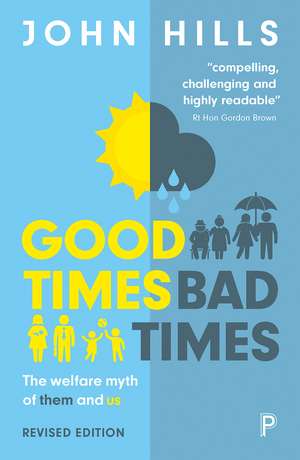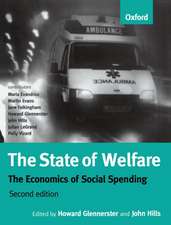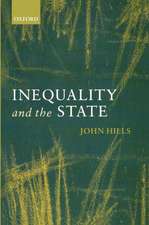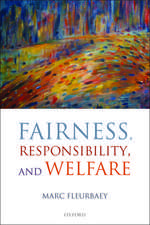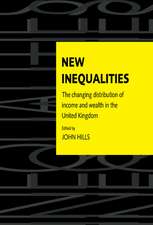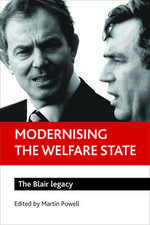Good Times, Bad Times: The Welfare Myth of Them and Us
Autor John Hillsen Limba Engleză Paperback – 21 feb 2017
Two-thirds of UK government spending now goes to the welfare state, and where that money is spent—healthcare, education, pensions, benefits—is at the heart of major political and public debate. Much of that debate is dominated by the myth that the population is divided into those who benefit from the welfare state and those who pay into it. But this groundbreaking book—fully revised in this second edition with current data, discussion of key policy changes, and a new preface reflecting on the changed UK political context following the 2015 election and 2016 Brexit vote—uses extensive research and survey evidence to challenge that view. It shows that our complex and ever-changing lives mean that all of us rely on the welfare state throughout our lifetimes, not just a small welfare-dependent minority. Using everyday life stories and engaging graphics, top UK social policy expert John Hills clearly demonstrates how the facts are far removed from the popular misconceptions.
| Toate formatele și edițiile | Preț | Express |
|---|---|---|
| Paperback (2) | 141.04 lei 3-5 săpt. | |
| Bristol University Press – 21 feb 2017 | 141.04 lei 3-5 săpt. | |
| Bristol University Press – 11 noi 2014 | 233.92 lei 38-44 zile |
Preț: 141.04 lei
Nou
Puncte Express: 212
Preț estimativ în valută:
26.99€ • 28.08$ • 22.28£
26.99€ • 28.08$ • 22.28£
Carte disponibilă
Livrare economică 25 martie-08 aprilie
Preluare comenzi: 021 569.72.76
Specificații
ISBN-13: 9781447336471
ISBN-10: 144733647X
Pagini: 352
Dimensiuni: 127 x 197 x 30 mm
Greutate: 0.5 kg
Ediția:Second Edition
Editura: Bristol University Press
Colecția Policy Press
ISBN-10: 144733647X
Pagini: 352
Dimensiuni: 127 x 197 x 30 mm
Greutate: 0.5 kg
Ediția:Second Edition
Editura: Bristol University Press
Colecția Policy Press
Notă biografică
John Hills is the Richard Titmuss Professor of Social Policy and codirector of the International Inequalities Institute at the London School of Economics and Political Science. He is coauthor, most recently, of Wealth in the UK: Distribution, Accumulation, and Policy.
Cuprins
Introduction: 'Them and us'
Are the poor too expensive? Redistribution and the welfare state
The long view: Social policies and the life cycle
It’s complicated: High frequency living
Good years, bad years: Reacting to change
The long wave: Wealth and retirement
The longest wave: From generation to generation
A moving backdrop: Economic crisis, cuts, growth and ageing
Conclusion: Britain’s misunderstood welfare state
Are the poor too expensive? Redistribution and the welfare state
The long view: Social policies and the life cycle
It’s complicated: High frequency living
Good years, bad years: Reacting to change
The long wave: Wealth and retirement
The longest wave: From generation to generation
A moving backdrop: Economic crisis, cuts, growth and ageing
Conclusion: Britain’s misunderstood welfare state
Recenzii
“At one level, Hills’s new book is a meticulous compendium of decades of empirical work that he and his LSE colleagues have undertaken into how the welfare state works. At another level, Good Times, Bad Times is more disruptive. It seeks to upend the divisive discourse that the book’s subtitle calls ‘the welfare myth of them and us.’ . . . Striking is his facility, too rare in today’s specialized academy, to zoom out from all this detail and present the big picture. . . . Hills can hit out with force once he is satisfied on the evidence.”
“Hills’s Good Times, Bad Times: The Welfare Myth of Them and Us traces the ways we contribute to and benefit from the welfare state across our lifetimes, setting to rest the insidious notion that there is any distinction between ‘strivers’ who pay in and ‘skivers’ who benefit. It is carefully evidenced and immensely readable, and I think a copy should be issued to every 16-year-old along with their National Insurance number.”
“An academic book for everyone. . . . Hills roundly debunks the myth of shirkers and strivers. He follows the money to get at the truth, and the result is every bit as revealing as an episode of The Wire.”
“[One of the Books of 2015]. . . . A cracking book . . ., it is a forensic account of the contemporary UK welfare state and readable enough to be my dad’s Christmas present.”
"Hills systematically shatters the myth that the welfare state merely supports an unchanging, undeserving underclass. Instead, social benefits go to the majority of Britons who utilize the welfare state to bridge crises and stabilize income, week to week and year to year. Hills gives life to this process by tracing the lifetime experiences of two fictitious, but statistically typical, extended British families. At any one moment, the welfare state redistributes income, benefiting some at the expense of others. But over time, the welfare state smooths income for nearly all British families, leveling out periods of income earned in the working lifetime with periods when work income is absent, such as in youth and old age. Joblessness and illness undermine the financial stability of many families, especially those with already low incomes. For these low-income families, who face more variable and uncertain flows of money, these income supports are vital. . . . Recommended.”
“Like zombies, ‘must reads’ are everywhere. But Hills’s book offers us a glimpse of a policy debate which has to happen sooner rather than later, and makes a case for the importance of social science analysis purely through its quality. It is vitally important we are armed with facts and examples when we finally must face up to reality, and, frankly, I have rarely been gladder to have read a book. All hail the twenty-first century’s Bruce Campbell.”
“Good Times, Bad Times is panoramic in its scope, based on extensive empirical evidence and presented in a lively and engaging manner. . . . Hills illustrates his analysis quite concretely with ‘case studies’ of two generations of fictional families, the Osbornes and the Ackroyds. He looks at how they pay into and benefit from the welfare state, at points in time, throughout their lives. . . . A powerful corrective to many of the myths of the welfare state.”
“I am sure that this book will come to be an invaluable tool in the ongoing battle to challenge the denigration of welfare and the continuing stigmatization of the most disadvantaged in society.”
“Hills points out that one of the starkest ways in which inequality manifests itself is through differences in mortality.”
“Should be compulsory reading not just for politicians and journalists, but for us all.”
“A valuable and thought-provoking study which should provide the basis for much policy analysis and making.”
“An interesting book that provides a coherent argument as to why the welfare state is important and why we should seek to protect it.”
“Impressive. Hills deftly navigates a course through a mass of histograms, graphs, and tables to keep to his central theme: the impermeable social divisions that apparently mark differences between the independent ‘us’ from the welfare-dependent ‘them’; skivers versus strivers, takers versus makers, and all that. The reality, Hills shows, is more dynamic and the vast majority of us both contribute to and benefit from the system of social welfare in the course of our lives. It is ‘our’ welfare state.”
“A lively and provocative book that will overturn your assumptions about the welfare state. A great read, and a ‘must read’ for policy makers and the public alike.”
“This hugely important book shows how populist understandings of the welfare state are wrong. Its message needs to reach the voting public before it is too late.”
“Hills shows that social policy is about stabilizing income over the life course, compensating for the vagaries of markets and life circumstances, enhancing opportunity for disadvantaged children and facilitating asset accumulation. Good Times, Bad Times makes it clear that there is considerable scope for improvement in public social programs. For those wishing to understand one of our most important and politically divisive institutions, this book is required reading.”
“A terrific book—really well written and intellectually compelling.”
“This book shows how we all receive welfare services and benefits throughout our lives, rich as well as poor: essential reading for policy makers, politicians, and citizens.”
“This is a beautifully researched academic howl of rage against the current myth of ‘welfare.’ Anyone who wants to understand the state of welfare—and of the welfare state—in the second decade of the twenty-first century really needs to read this book.”
“This book is an extremely important contribution to central debates about the United Kingdom’s welfare state, deploying a wealth of statistical and research evidence in a highly accessible fashion to fundamentally challenge widely held perceptions about who benefits and who pays.”
“Hills passionately and rigorously shows how very different families rely on the intergenerational contract we call the welfare state. Accessible and learned, it is a myth buster.”
“In this excellent and accessible book Hills sets out to establish what is really going on in the contemporary welfare system in the United Kingdom.”
